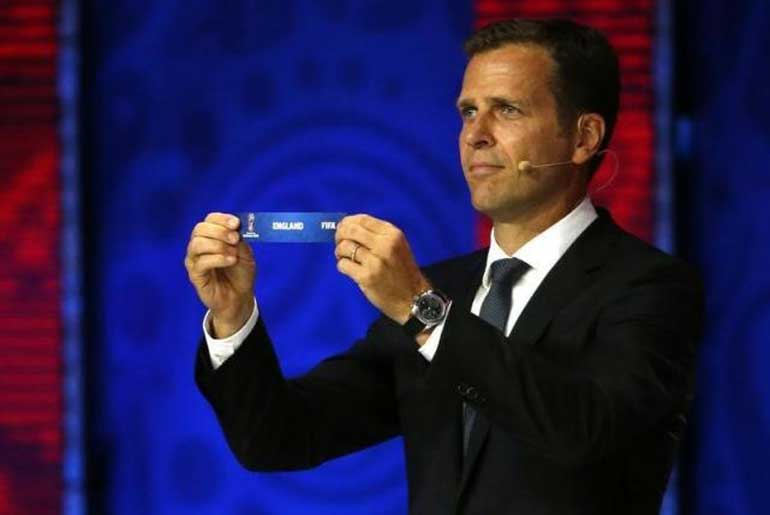Saturday Feb 07, 2026
Saturday Feb 07, 2026
Monday, 27 July 2015 00:00 - - {{hitsCtrl.values.hits}}
 Former German soccer player Oliver Bierhoff holds up the slip showing 'England' during the preliminary draw for the 2018 FIFA World Cup at Konstantin Palace in St. Petersburg – REUTERS
Former German soccer player Oliver Bierhoff holds up the slip showing 'England' during the preliminary draw for the 2018 FIFA World Cup at Konstantin Palace in St. Petersburg – REUTERS
FIFA put its problems to one side and began the countdown to the 2018 World Cup finals on Saturday when Russian president Vladimir Putin and FIFA chief Sepp Blatter re-assured the nation the tournament would go ahead as planned.
A glitzy preliminary-round draw ceremony was beamed live to 170 countries around the world, sending a powerful message that the finals would take place no matter what enquiries are going on over alleged voting irregularities which secured Russia the hosting rights five years ago.
Blatter confirmed that Russia would stage the tournament, saying that the FIFA executive committee had “full trust and confidence”. Putin told the global audience that “Russia will be fantastic hosts.”
Putin also pledged to host a World Cup – in a country where racism is rife at soccer matches – promising both domestic and foreign players and fans would feel at home at a “grandiose international sporting festival”.
All 209 FIFA members registered to take part in the finals, and although 22 teams have already been eliminated, 851 matches will be played over the next 32 months to establish the 31 teams who will join Russia at the tournament in June 2018.
World champions Germany were handed a kind draw when they were placed in the same group as the Czech Republic, Northern Ireland, Norway, Azerbaijan and San Marino.
There was ironic laughter when Oliver Bierhoff, the general manager of the German national team, drew his country out of the bowl.
“I’m pleased we avoided Spain or Italy, but I am sure all the top teams will go through,” Bierhoff said.
Spain and Italy, the previous World Cup winners before Germany, were drawn together while the Netherlands and France, two other European powerhouses, were also placed in the same group.
That was partly because UEFA, European soccer’s governing body which is looking to increase revenue from TV and other commercial marketing opportunities, decided to place their top six ranked teams in six-team groups rather than five so they play extra matches.
Slight manipulation
Slight manipulation of the draw was needed to ensure that happened, but even though they might have tougher qualifiers than usual, they should all qualify because the second-placed team in each group will take part in seeded playoffs.
Among some of the more eye-catching European pairings was England being drawn with Scotland, the old rivals who played the world’s first international in 1872.
Cameroon, the first African country to make a major impact in the World Cup when they reached the quarter-finals in 1990, must negotiate a tricky two-leg knockout tie against Somalia or Niger at the start of their campaign.
South Sudan, who joined FIFA in 2012, will face Mauritania in their first-ever qualifier. The winners play Tunisia in the second round.
African champions Ivory Coast, seeking a fourth successive finals appearance, will play Liberia or Guinea-Bissau.
Angola will meet South Africa in arguably the toughest of the second-round meetings.
The qualifying competition, already underway in Asia and the CONCACAF zone, will end globally in November 2017.